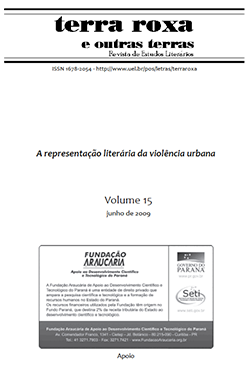Isaías Caminha: a narrator behind the scenes of news
DOI:
https://doi.org/10.5433/1678-2054.2009v15p86Keywords:
Lima Barreto, Brazilian Literature, Language and powerAbstract
Recordações do Escrivão Isaías Caminha (Recollections of the clerk Isaías Caminha) is the first book published by Lima Barreto and it has always been seen as a book in which the author's subjective issues badly influence the narrative. This paper intends to show that the use of the character Isaías Caminha, a poor mulatto, has an important role to reveal the power structures in the first days of the Brazilian Republic. Hence, Isaías Caminha goes through a significant process of learning in the newspaper he works for that leads him to make use of a language style in his recollections which are opposite to the one practiced by writers of the dominant social class.Downloads
References
BARRETO, Lima. Recordações do escrivão Isaías Caminha. 5ª ed. São Paulo: Brasiliense, 1971.
BENJAMIN, Walter. Obras escolhidas I - magia e técnica, arte e política. 7ª ed. São Paulo: Brasiliense, 1994.
BOSI, Alfredo. "O romance social: Lima Barreto". História concisa da literatura brasileira. 36ª ed. São Paulo: Cultrix, 1999.
FANTINATI, Carlos Erivany. O profeta e o escrivão: estudo sobre Lima Barreto. São Paulo: Ilhpha-Hucitec, 1978.
SANTIAGO, Silviano. "Uma ferroada no peito do pé (dupla leitura de Triste Fim de Policarpo Quaresma)". Vale quanto pesa - ensaios sobre questões político-culturais. Rio de Janeiro: Paz e Terra, 1982.
Downloads
Published
How to Cite
Issue
Section
License
Copyright (c) 2009 Terra Roxa e Outras Terras: Revista de Estudos Literários

This work is licensed under a Creative Commons Attribution 4.0 International License.
Authors who publish in this journal agree to the following terms:
a) The authors retain the copyright and grant the journal the right of first publication, the work being simultaneously licensed under the Creative Commons Attribution-NonCommercial 4.0 International License, allowing the sharing of the work with acknowledgment of the authorship of the work and initial publication in this journal.
b) Authors are authorized to assume additional contracts separately, for non-exclusive distribution of the version of the work published in this journal (eg, publish in an institutional repository or as a book chapter), with acknowledgment of authorship and initial publication in this journal.
c) Authors are allowed and encouraged to publish and distribute their work online (e.g. in institutional repositories or on their personal page) after the editorial process, as this can generate productive changes as well as increase impact and citation of the published work (See The Effect of Open Access).
d) The authors of the approved works authorize the journal to, after publication, transfer their content for reproduction in content indexers, virtual libraries and the like.
e) The authors assume that the texts submitted for publication are of their original creation, taking full responsibility for their content in case of any objection by third parties.




















